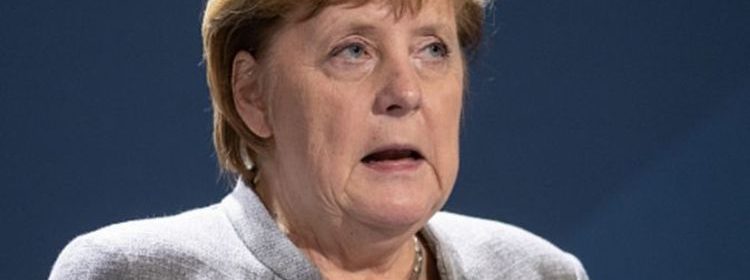Seriously?! 150,000 AstraZeneca jabs to expire in Germany – months after scaremongering

Angela Merkel discusses the delivery of vaccine doses to Ukraine
We use your sign-up to provide content in ways you’ve consented to and to improve our understanding of you. This may include adverts from us and 3rd parties based on our understanding. You can unsubscribe at any time. More info
Around 15,300 doses of the AstraZeneca vaccine are in huge danger of expiring in Bavaria, Germany. Their shelf life expires at the end of July, said Health Minister Klaus Holetschek (CSU) on Tuesday after a cabinet meeting in Munich.
He emphasised that ultimately the federal government had to decide how to proceed and at the same time warned not to let any vaccine doses expire.
For this reason, Bavaria has already made proposals to the federal government as to how the vaccine can be used “where it is met with acceptance,” said Mr Holetschek.
He added: “Perhaps there are also states that have a close relationship with the state of Bavaria or with the cities that have the vaccine [which will expire].”
According to the Ministry of Health, Bavaria currently has around 280,000 AstraZeneca vaccination doses in stock.


Another 22,000 doses of this will expire at the end of August, and around 5,600 by the end of September.
Most of the doses, around 239,000, could still be used by the end of October.
Despite the country’s reluctance to get jabbed, Germany will not make vaccination against COVID-19 compulsory, Chancellor Angela Merkel said on Tuesday, adding that ensuring more Germans get vaccinated, sticking to distancing rules and testing should help prevent a fourth wave.
She said: “We have no intention of going down this road.
“There will be no compulsory vaccination.”
It comes as French President Emmanuel Macron announced on Monday that the unvaccinated would face restrictions aimed at curbing the quick spread of the Delta variant.
READ MORE: Laschet silenced when asked what Merkel can do better than him
Unveiling sweeping measures to combat a surge in infections, President Macron said on Monday night that vaccination would not be compulsory for the public for now but stressed that restrictions would focus on those who are not vaccinated.
The president said health workers had to get vaccinated by September 15 or face unspecified consequences, a proclamation that outraged some employees.
Stanislas Niox-Chateau, who heads Doctolib, one of the country’s biggest online websites used to book vaccine appointments, told RMC radio there were record numbers seeking vaccines after the president’s announcement.
In nearly 24 hours, some 1.7 million vaccine appointments had been booked through Doctolib, the website said.
DON’T MISS:
You’re on your own, Emmanuel! Merkel breaks EU ranks with France [INSIGHT]
Jacob Rees-Mogg sums up SNP’s ‘rot in hell’ apology [VIDEO]
Brexit LIVE: Meddling Lords poised to ambush Lord Frost [LIVE BLOG]

Meanwhile daily vaccinations hit a new high on Tuesday.
Prime Minister Jean Castex said on Twitter: “Today 792,339 have received a first jab, a new record.
“This drive must amplify and continue in the coming weeks.”
For most of June and July, the country averaged roughly 570,000 shots a day, according to Our World in Data.
France has given nearly 53 percent of its population at least one dose of the vaccine and 37 percent are fully vaccinated.
President Macron said on Monday that a health pass required to attend large-scale events would now be used much more widely, including to enter restaurants, cinemas and theatres.
It will also be required to board long-distance trains and planes from the beginning of August, giving a further incentive for people to get the shot as the summer holiday season kicks in.
French retailers were puzzled over how the government expected them to block people not vaccinated against COVID-19 from shopping malls and other public places.
A slowdown in vaccination rates and a sharp upturn in new infections due to the highly contagious, now dominant, Delta variant, have forced several countries to rethink their strategies.
In France, new infections peaked at more than 42,000 per day in mid-April before falling to 2,000 per day in late June. Now the country is recording on average 4,000 new cases a day, with the rate of new infections doubling every five days.
Finance Minister Bruno Le Maire warned on Franceinfo radio that the only obstacle to France achieving six percent economic growth in 2021 would be an uptick in COVID-19 due to the Delta variant.
The number of confirmed coronavirus cases in Germany increased by 1,548 to 3,738,683, data from the Robert Koch Institute (RKI) for infectious diseases showed on Wednesday.
The reported death toll rose by 28 to 91,287, the tally showed.
Additional reporting by Monika Pallenberg
Source: Read Full Article
